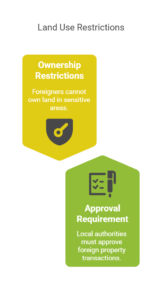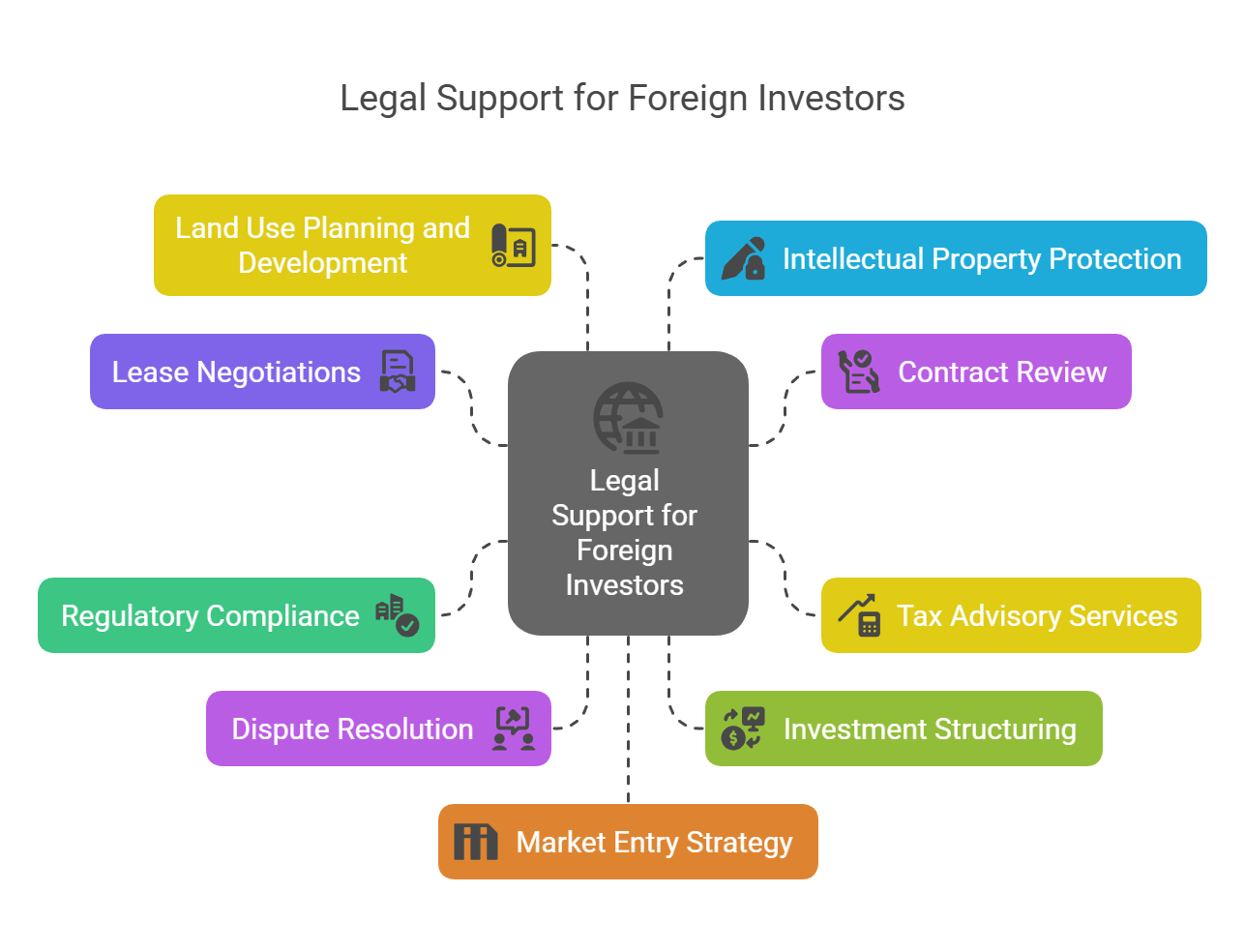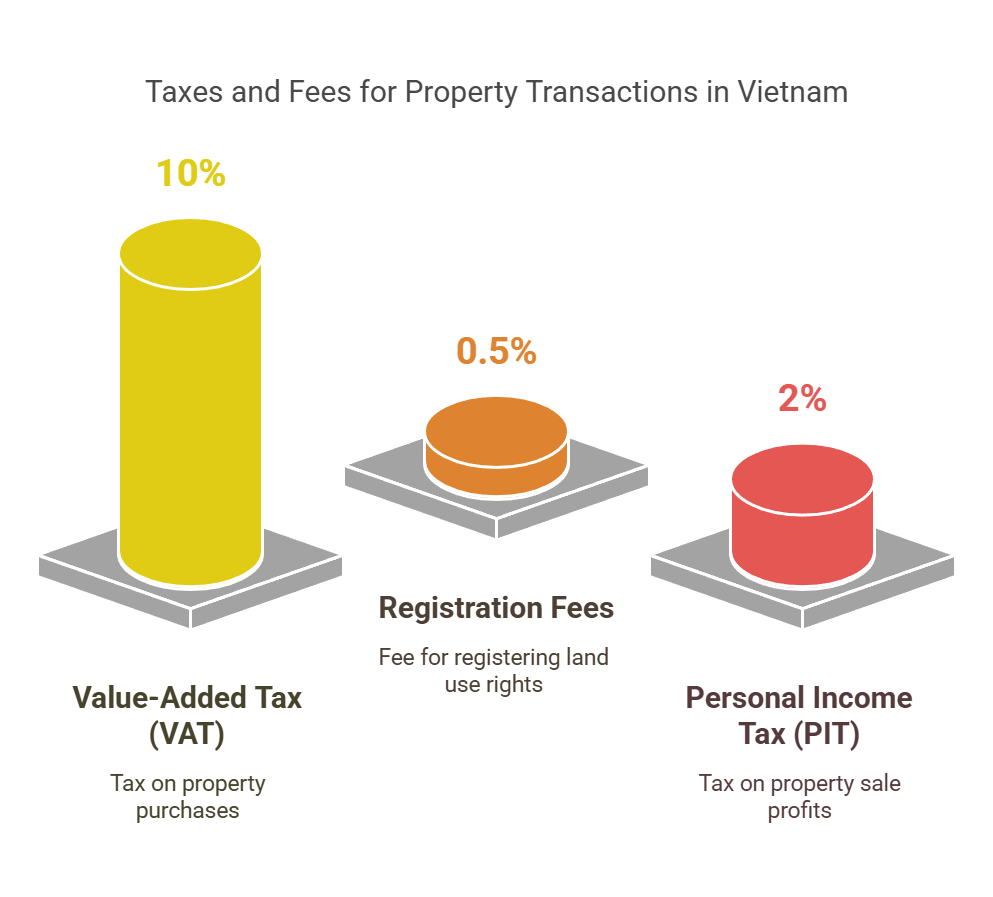
Land Use Rights in Vietnam’s Real Estate Market
Exploring Land Use Rights in Vietnam’s Thriving Real Estate Market Vietnam’s real estate market is brimming with opportunities for international investors, driven by rapid economic growth and rising demand for properties. However, understanding land use rights—a fundamental aspect of the country’s legal framework—is crucial for unlocking the market’s full potential. Vietnam presents both opportunities and challenges with its unique regulations on foreign ownership and leasehold agreements.
Land use rights
Vietnam’s real estate market offers highly attractive opportunities for international investors. With rapid economic growth, an investor-friendly environment, and a rising demand for residential and commercial properties, the potential for high returns is substantial. However, foreign nationals are not permitted to directly own land in Vietnam, as all land is state-owned. Instead, foreign individuals and entities can acquire Land Use Rights (LURs) through lease agreements. The standard lease term is 50 years, with the possibility of a 50-year extension, subject to the project’s specifics and approval from local authorities.
- Essential Information for Foreign Investors to Know:
- Foreign investors can lease land for up to 50 years, with the option to apply for extensions.
- Lease agreements must specify the intended purpose of the land, such as residential, commercial, or industrial use.
- While foreigners may own buildings or structures erected on leased land, they cannot own the land itself.
- Ensuring compliance with local regulations is critical, including obtaining:
Investment Registration Certificate (IRC) – to validate foreign investments.
Enterprise Registration Certificate (ERC) – required for foreign-owned businesses operating in Vietnam.

Residential property ownership
Although foreigners are not permitted to own land use rights in Vietnam, they are allowed to own residential properties like apartments or houses through leasehold agreements within commercial housing projects. For further guidance, you can explore resources like the article “2 Simple Methods for Foreigners to Purchase a House in Vietnam,” which provides valuable homeownership tips.
Foreign ownership is capped at 30% of the total apartments in a condominium. In housing developments, foreigners can own up to 10% of the total houses within a project.
- Example:
A foreign individual may purchase a townhouse in Da Nang, provided the property is located within a development project approved for foreign ownership. However, the total foreign ownership in the residential area must not exceed 10% of the total number of houses, as regulated by Vietnam’s housing laws.
Restrictions on Land Use Rights in Sensitive Locations
Foreign nationals are prohibited from owning property or leasing land in areas classified as sensitive to national security. These include regions near military installations or critical government sites. This regulation serves to safeguard national interests and security. Before purchasing property, it is imperative for foreigners to confirm that the location does not fall within these restricted zones.
- Key Limitations on Foreign Land Use Rights
- Foreigners are not permitted to own property or land use rights in zones designated as sensitive to national defense.
- Property transactions involving foreigners require approval from local authorities to ensure compliance with security regulations.

In view of the above, navigating these complexities with the right expertise can be the key to success in this dynamic and changing landscape. Foreign investors need special legal support to approach the acquisition process flawlessly.

Lease Negotiations
Expert legal advice is essential for securing favorable terms for long-term land leases. Legal firms can assist investors in negotiating lease agreements that protect their interests and ensure compliance with Vietnamese laws. Vietnam’s legal framework for real estate includes specific provisions and restrictions on land leases for foreign entities. Legal experts help investors understand these provisions, negotiate the best possible terms, and ensure that all agreements comply with the law. This can include negotiating lease durations, renewal terms, rent adjustments, and clauses that protect against unforeseen circumstances or changes in legislation.
Contract Review
Ensuring that all contracts are compliant with Vietnamese property laws is crucial for avoiding legal disputes and protecting investment returns. Legal experts can review and draft contracts to ensure they meet all regulatory requirements and protect the interests of foreign investors. Contract review services are critical in identifying potential pitfalls and ensuring that all parties understand their rights and obligations. This can encompass sales agreements, lease agreements, joint venture contracts, and other legal documents related to property transactions. Legal firms also provide due diligence services, verifying the authenticity and legality of property titles, zoning regulations, and environmental compliance.
Tax Advisory Services
Helping investors meet their tax obligations while maximizing investment returns is another critical service provided by legal experts. Tax advisory services can help foreign investors navigate the complex tax landscape in Vietnam and ensure compliance with all relevant tax laws. These services include advising on property taxes, income taxes, value-added taxes, and other applicable levies. Legal experts can help investors structure their investments in a tax-efficient manner, taking advantage of available incentives and avoiding potential tax liabilities. They also assist with tax filings, reporting requirements, and dispute resolution with tax authorities. Foreigners engaging in property transactions in Vietnam are subject to a range of taxes and fees, including:
- Land Lease Fees: Based on the value and terms of the lease.
- Value-Added Tax (VAT): A 10% VAT applies to property purchases.
- Registration Fees: These fees typically represent 0.5% of the land’s value when registering land use rights.
- Personal Income Tax (PIT): Property sellers must pay 2% PIT on the sale price.

Regulatory Compliance
Vietnam’s real estate market is governed by a range of laws and regulations that foreign investors must comply with. Legal firms assist investors in understanding and adhering to these regulations, which can include foreign ownership limits, land use rights, building codes, and environmental standards. Compliance with these regulations is essential for avoiding legal disputes, fines, and other penalties. Legal experts monitor changes in legislation and keep investors informed of any new requirements or potential impacts on their investments.
Dispute Resolution
Despite the best efforts to ensure compliance with and protect investments, disputes can still arise in the real estate sector. Legal firms offer dispute resolution services, including negotiation, mediation, and litigation support. These services are essential for resolving conflicts with tenants, partners, contractors, or regulatory authorities. Legal experts represent investors in court or arbitration proceedings, seeking to achieve favorable outcomes and protect their interests. They also provide advice on risk management strategies to minimize the likelihood of disputes and ensure effective resolution when they occur.
Investment Structuring
Proper structuring of real estate investments is crucial for optimizing returns and managing risks. Legal firms advise investors on the best legal structures for their investments, whether through direct ownership, joint ventures, or other arrangements. This includes setting up legal entities, drafting partnership agreements, and ensuring compliance with corporate governance requirements. Investment structuring services also encompass financing arrangements, helping investors secure funding through loans, equity investments, or other means. Legal experts assist with drafting and negotiating loan agreements, security documents, and other financial contracts.
Land Use Planning and Development
For investors involved in property development, legal firms provide guidance on land use planning and development regulations. This includes obtaining necessary permits and approvals, complying with zoning laws, and ensuring that development projects meet all legal requirements. Legal experts assist with environmental impact assessments, public consultations, and other regulatory processes. They also advise on construction contracts, procurement procedures, and project management strategies to ensure successful and compliant development projects.
Intellectual Property Protection
In addition to real estate-specific services, legal firms offer intellectual property protection for investors’ brands, designs, and innovations. This is particularly relevant for investors developing commercial properties, such as hotels, shopping centers, and office buildings. Legal experts assist with trademark registration, patent applications, and copyright protection. They also provide advice on licensing agreements, franchising arrangements, and other intellectual property matters.
Market Entry Strategy
Entering the Vietnamese real estate market requires a well-thought-out strategy. Legal firms provide market entry services, helping investors understand the local market dynamics, regulatory environment, and investment opportunities. This includes conducting market research, assessing potential risks, and developing entry plans that align with investors’ goals and resources. Legal experts also assist with establishing local partnerships, navigating bureaucratic processes, and ensuring compliance with all regulatory requirements.
Conclusion
In conclusion, investing in Vietnam’s real estate market offers significant potential for growth and profitability, thanks to its robust economic growth, favorable investment climate, and the increasing demand for residential and commercial properties. However, navigating the legal and regulatory landscape can be complex, requiring expert advice and careful planning. Legal support is essential for securing land use rights, managing investments, and ensuring compliance with Vietnamese regulations. With the right legal strategy, foreign investors can confidently enter and thrive in Vietnam’s dynamic real estate market.



Leave A Comment